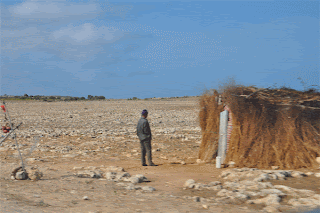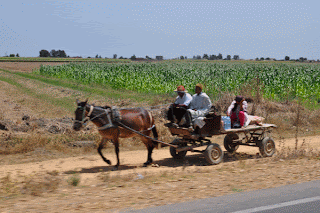Over the 5 months leading up to arriving in Morocco, many of the European people we had met along the way warned us of the ‘huge culture shock’. However, when we first entered this northern tip of Africa, it was almost like landing back in Bali.
There are many similarities to our Indonesian home. First there was the 2-hour shemozzle on arrival at the port, with endless manual paperwork and Moroccan’s saying they would help for money, (all in 40-degree heat!). Then the suicidal ‘no-rules’ driving, where buses overtake trucks around corners. There are also more taxis than people, thousands of street dogs, endless rubbish and plenty of unfinished houses and roadworks.
Once you get through the initial stage you soon love this beautiful, dry country. The Moroccan landscape is one filled with barren desert and a mountainous backdrop. Each day was filled with clear blue skies and topped with sweltering heat, all tempered by the turquoise ocean. Along the busy roads, where you’re just as likely to pass a horse and cart as a car, there are thousands of roadside fruit, vegetable and craft stalls. They are all fresh and organic at a cheap bartering price.
The language was a big interest to us. Moroccan’s mother tongue is Arabic but most also speak French from the past French occupation. The written word of Arabic called ‘Sanskrit’ is one of the most beautiful looking languages I have seen. We often looked at it together trying to guess what it was saying.
Morocco is widely renowned for its epic surf, but our timing to visit Morocco for a surf road-trip was as good as trying to go snowboarding in Australia during summer! Not only is August traditionally flat with little to no swell but there are 40’C days, and strong onshore winds most afternoons.
Nevertheless, we were lucky to catch a great summer swell and scored what were the best waves on our whole trip so far. There were punchy beach-breaks at Jack Beach and long peeling lefts at La Babine. The water was as cold as the air was warm, plus there were thousands of sea urchins lining the rock entry onto the point at La Babine. Tim spent an hour one night plucking urchin spines from my feet, but it was all worth it! The same night we found out that someone had died at La Babine that day, not a surfer, but a fisherman who was swept off the rocks. And we thought the crowd had gathered to watch Timmy surf!
There is also a flourishing local surf community in Morocco. One night we were camping in the beach carpark when someone tapped on our van. We were worried that we were going to get kicked out, or worse. But it was just a local surfer, making sure we were OK, had scored some waves and eaten a good dinner. He even offered for us to come down and smoke some hash with him the next day if we wanted and use his wireless connection. Pretty funny how so many people tell you to ‘watch out for sneaky Moroccans’, yet all we received was friendly help.
One of the other things, which made the trek in this country a little tougher was that is was the Muslim religious month of fasting, called Ramadan, while we were there. Every restaurant was closed during sunlight hours and the walls echoed prayers from the nearby mosques as many walked past us with prayer mats over their shoulders. We were quite familiar with this Islamic tradition from our time in Indo, but it is even more intense in the Arab world.
Ramadan is a sacred lunar month celebrated each year by Muslims. It marks the auspicious month in which God revealed to first verses of the Koran to the Islamic prophet Mohammad. During this month all Muslims of age refrain from eating, drinking, smoking and sex during daylight hours. The act of fasting is said to redirect the heart away from worldly activities, with its purpose being to cleanse the inner soul and free it from harm. It also teaches Muslims to practice self-discipline, self-control, sacrifice, and empathy for those who are less fortunate; thus encouraging actions of generosity and charity.
However, it also means low blood sugar, nicotine withdrawals, short tempers and extra crazy driving during the day. By sunset everyone is back to their happy selves, sharing a meal with family and friends but it is a strange time for a foreigner.
The additional culture shock that you get when visiting Morocco is one you can only truly experience if you are a woman. The restrictions of the different standards that are set in Islamic countries are hard to get used to having grown up in a liberal, open-minded western country. Dressing covered head to toe and not touching any men in public (even to receive change), was something I had to quickly accept and correspond to while in Morocco.
One Moroccan we spoke to about it clearly explained it to us. He said that you may wear short shorts or a bikini if you like, but you would be disrespecting our country as a visitor and hurting a lot of people’s feelings in the process. Since Ramadan is such a sacred month, this feeling is multiplied ten-fold. This was enough for me to adhere to the rules as a visitor to their beautiful country.
The joy of travelling to places like Morocco is a catalyst for good conversation. Along our road trip and sunset watching we had so many great conversations. Some highlights were the comparison of the Bible to the Koran, the need for Muslim women to cover in public, and the difference of 1st world country problems like ‘my internet is running so slow’ or ‘my car needs cleaning’ versus 3rd world country problem like ‘where do I find medicine for my sick baby?’, ‘where will I find my next meal?’ and ‘my donkey is getting too old to carry fruit to the market’.
I think travelling is a blessing in this way. It challenges our normally sheltered existence and exposes us to what others lives are like worldwide.
As travel became readily available and accessible in the 21st century, this delivered the pathway for the international business to boom. These days it amazes me that I can fly from Australia to somewhere like Portugal, on the most opposite side of the world, and still expect to see my favourite fashion stores like Zara and find a Starbucks café with fast free WIFI. It all becomes an expectation that we can leave one sheltered life with all materialistic needs and fly close to anywhere on the planet and expect the same as you do in your country.
That is until you are pushed out of your normal boundaries and visit places like South America, India, Indonesia or Morocco. For Tim and I this is the essence of travelling; switching off from the materialistic world we know and throw ourselves head first into the culture and embrace it. Life begins at the end of your comfort zone.
After a crazy week in a crazy country we headed up to Tangier to catch the ferry back to Spain. However, Morocco didn’t let us out of her grip without one final little goodbye. While driving in hectic traffic, on the way back to the port, a man wound down his window and started yelling at us in Arabic at the traffic lights. Tim tried to explain in broken French that we couldn’t understand. The man kept pointing to the lock of the door and then the back of our van. Horns started blearing and the lights went green. We took off again. That's when Tim saw him. A cheeky little Moroccan urchin child was clinging onto the back of Snowflake, while we were going 60km/h around a roundabout. He was trying to break into the back. His head and hand appeared in the rear vision mirror as we swerved and Tim almost crashed in fright. When we got to the next light Tim pulled on the handbrake and jumped out of the van, to boot the kid off the back. He was gone though. We still have no idea where to, whether he fell off at top speed or jumped off as we slowed down is anyone’s guess. Lucky the back was locked all along. All in a normal day’s travel in Africa.
With that one last little reminder that the world is a weird and wonderful place, we slid through customs without trouble, back to the safety net of mainland Europe.



















No comments:
Post a Comment